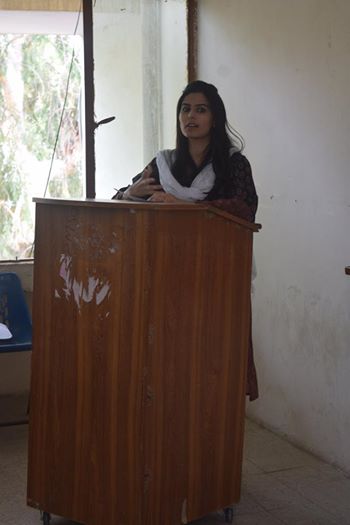
Farieha Aziz, the director of civil society organisation Bolo Bhi, shared these views at a seminar organised by the department of sociology at Karachi University in collaboration with the National Students Federation (NSF) on Friday.
The seminar aimed to create awareness about the cybercrime law and how it will affect and control the common man’s right to freedom of speech.

Not more than three students out of the gathering of around 50 raised their hands when asked if they were aware of the recently passed law on cybercrimes. “It directly affects the common man but people do not know their rights,” said Aziz. The law [then a bill] has been passed by the Parliament, she explained, adding that it deals with computer and internet related crimes.
Talking about the background of the law, she explained that the legislation has always been there in the country since 2007 in different shapes. According to her, it came as an ordinance in former military dictator Pervez Musharraf’s era and got lapsed in 2009. Then the Pakistan Peoples Party-led government worked on the ordinance to make it a bill and prepared a draft, she said. The draft was withdrawn by the National Assembly due to external pressures. The civil society then presented an alternative draft in the Cabinet Division in 2014, said Aziz. When the National Action Plan was developed after the Army Public School, Peshawar, attack, its twelfth point was about hate speech through technology, which was a part of the draft presented by the civil society, but there was no update on the bill or act.
“In March, 2015, we received a leaked copy of the 44-page bill, which was very different from the one presented [by the civil society] and had many clauses that actually puts a full stop on freedom of speech,” said Aziz, adding that soon after the National Assembly’s standing committee on information technology passed a similar version of the bill and sent it to assembly for approval.
“Bills, acts and laws are made for good but misuse is the main issue where people use [certain] clauses to their favour,” said the director of Bolo Bhi.
Explaining section 18 of the law, Aziz said that it deals with false statement and harm to reputation and gives Pakistan Telecommunication Authority (PTA) the authority to block a website or a particular person. She also talked about section 34, which deals with political censorship.
Aziz further informed the audience that under the law, the time span of personal search history and activities on the internet that are saved with the internet protocol (IP) for 90 days has been extended to one year. She added that an authorised officer has been allowed to have access to the saved information under the law. “People have to stand up and speak because these kinds of laws and acts are needed to curb [crimes] and not to damage the freedom of speech,” she said.
Seconding Aziz, NSF leader Khurram Ali said that when people are stopped from speaking their mind in mainstream media, they choose social media platforms to talk about corruption and other wrongdoings that they see. “But now we are also stopped to a certain level on social media platforms,” he said. According to him, stopping people from speaking and discussing their ideas will result in violence and conflict only. He added that when people keep their thoughts to themselves, they are likely to end up frustrated and angry.
Published in The Express Tribune, September 3rd, 2016.




1730959638-0/trump-(19)1730959638-0-165x106.webp)












COMMENTS
Comments are moderated and generally will be posted if they are on-topic and not abusive.
For more information, please see our Comments FAQ